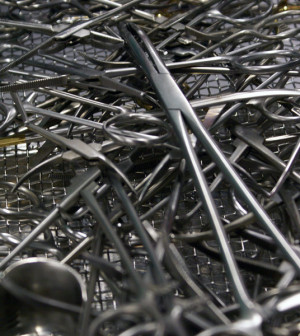- Gelatin vs. Collagen: Which is Best for Skin, Nails, and Joints?
- The Long-Term Effects of Daily Turmeric Supplements on Liver Health
- Could Your Grocery Store Meat Be Causing Recurring UTIs?
- Are You Making This Expensive Thermostat Error This Winter?
- Recognizing the Signs of Hypothyroidism
- 10 Strategies to Overcome Insomnia
- Could Artificial Sweeteners Be Aging the Brain Faster?
- Techniques for Soothing Your Nervous System
- Does the Water in Your House Smell Funny? Here’s Why
- Can a Daily Dose of Apple Cider Vinegar Actually Aid Weight Loss?
Sequence of Shots May Lead to Effective HIV Vaccine, Mouse Study Finds


It’s unlikely that a single vaccine would ever enable the body to neutralize the HIV virus, but a sequence of immunizations might hold the key, a new mouse study suggests.
The immune system could be guided in a series of steps to develop a special type of HIV-fighting antibody, a team of researchers said.
Each immunization would be customized for specific stages of the immune system’s response to the virus. In the end, the series of shots would result in the production of broadly neutralizing antibodies capable of fighting HIV, the authors said.
“As HIV mutates in a patient, the immune system continually adapts. In some patients, this process produces broadly neutralizing antibodies, which are unusual antibodies that can bind to and neutralize a wide range of globally occurring HIV variants. These are the antibodies we want to try to elicit with a vaccine,” co-first author Pia Dosenovic, a postdoctoral fellow at Rockefeller University in New York City, said in a school news release.
Co-first author Lotta von Boehmer, an instructor in clinical investigation at Rockefeller, said in the release, “Our experiments suggest that by stimulating the immune response with tailored immunizations at specific stages, it may be possible to successfully mimic this process.”
Whether this process could be mimicked in humans remains to be seen, as animal research doesn’t always translate to humans.
The study was published recently in the journal Cell.
HIV is constantly mutating, the researchers explained. That makes it difficult for the immune system to produce effective antibodies — substances made by the immune system to fight specific foreign invaders.
But one part of the HIV virus — the binding site the virus uses to attack immune cells — can’t mutate, the researchers noted. This site can’t change because the virus needs it to attach to healthy cells and infect them. Broadly neutralizing antibodies, which are produced by immune cells called B cells, can target this site and defeat the virus’ attempts to protect it.
B cells undergo many mutations to refine their antibodies. Some people infected with HIV develop these neutralizing antibodies naturally once they are infected, but they are few in number. Scientists have tried to bring about the production of these neutralizing antibodies with a vaccine, but have been largely unsuccessful.
In the current study, the researchers attempted to produce these antibodies in mice with not one, but a sequence of immunizations both early in their immune systems’ initial response to HIV and later on in the process. They pointed out that the mice they used were genetically engineered to produce antibodies closely resembling those of people.
The researchers found that by administering specifically tailored antigens at specific times, the immune system’s response can be coached through the process of developing broadly neutralizing antibodies. Antigens are substances on the surface of a cell that stimulate antibody production.
“While our results suggest sequential immunizations may make it possible to vaccinate against HIV, we have only just begun to understand how this sequence would work,” Dosenovic said. “We know the beginning and the end, but we don’t know what should happen in the middle.”
More information
The U.S. National Institute of Allergy and Infectious Diseases provides more information on HIV vaccine research.
Source: HealthDay
Copyright © 2026 HealthDay. All rights reserved.










